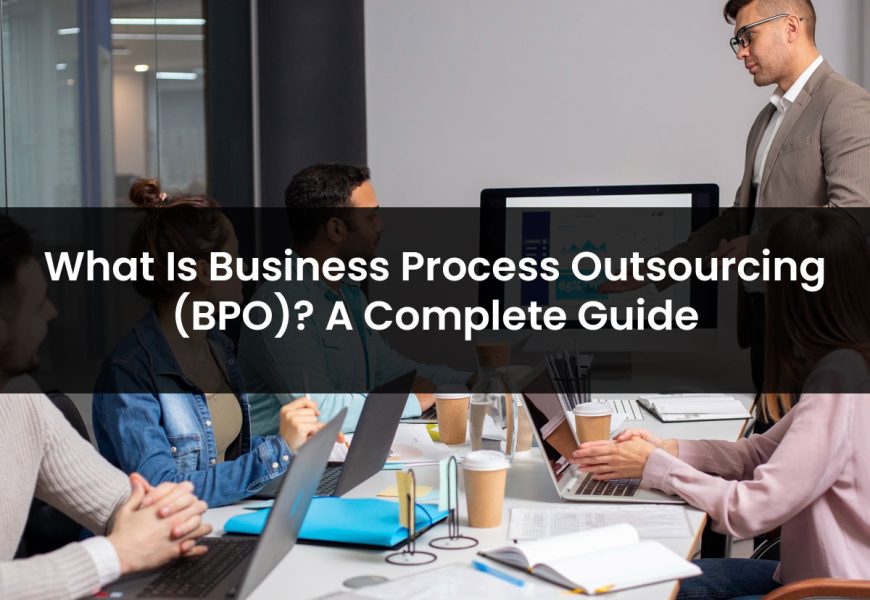Business process outsourcing or BPO is the process of companies outsourcing their complete business functions to another company. Just like many other services that can be outsourced, like payrolling, customer service, or human resources (HR), your business process and functions can also be outsourced.
In this article, we will be discussing how business process outsourcing can help your business, how to outsource it, its benefits, and much more.
What is Business Process Outsourcing?
BPO or business process outsourcing is the process of subcontracting third-party vendors for all business-related functions. It has evolved from the outsourcing that was primarily used for supply chain management. Currently, it spans multiple industries like healthcare, energy, asset management, etc. Outsourcing has long been understood as an efficient method of management that cuts costs by leveraging the best technology and specialised expertise.
Companies of all sizes, from small startups to large corporations, often choose to outsource various processes. This approach allows them to tap into innovative services that enhance their operations and efficiency.
BPO typically focuses on two main areas: back-office and front-office operations. Back-office BPO involves outsourcing essential support functions such as accounting, payment processing, IT services, human resources, regulatory compliance, and quality assurance. By handing these tasks over to external professionals, businesses can streamline their operations and take advantage of technological advancements like cloud computing and AI, which boost efficiency and quality while cutting costs.
On the other hand, front-office BPO includes customer-facing tasks such as technical support, sales, and marketing. Outsourcing these services enables businesses to improve customer experiences and maintain a competitive edge in the marketplace.
The global business process outsourcing market was valued at $281 billion in 2023 and is expected to grow at a compounded annual growth rate of 9.6% from 2023 to 2030.
Special Considerations
When deciding on BPO options, businesses must consider whether to outsource domestically or internationally.
Offshore outsourcing involves contracting operations to a country that offers benefits like political stability, lower labour costs, or tax advantages. For example, a U.S. company might choose to work with an offshore BPO provider in Singapore.
Nearshore outsourcing, by contrast, involves partnering with a BPO vendor in a neighbouring country, such as a U.S. company outsourcing to Canada.
Lastly, onshore outsourcing, also known as domestic sourcing, occurs when a company outsources within its own country, even if the vendor is located in a different city or state.
BPO is often referred to as information technology-enabled services (ITES) because it relies heavily on technology and infrastructure that allow external companies to perform these outsourced tasks efficiently.
How Does Business Process Outsourcing Work?
Business process outsourcing typically begins when a company identifies a need for external expertise in a specific business function, such as marketing, supply chain management, or accounting. Recognising the potential benefits of outsourcing, the company started exploring different BPO providers that specialize in the required service. It’s common for the company to contact multiple BPO providers to assess which one might be the best fit.
After initiating contact with a prospective BPO provider, discussions begin to determine the company’s specific needs. The BPO provider often customizes their services to meet these unique requirements, leading to a tailored solution. This approach means that no two BPO-client relationships are the same. The BPO provider then drafts a contract typically referred to as a master service agreement (MSA) or service-level agreement (SLA), which outlines the general terms of the partnership.
Upon receiving these agreements from the potential BPO providers, the client company’s decision-makers evaluate them to determine which provider offers the best value. The company may also select a backup BPO provider in case the primary choice fails to meet expectations.
Once the BPO provider is hired, more detailed agreements, known as statements of work (SOW), are often developed. These documents outline the specifics of how each project will be managed by the BPO provider. The ongoing relationship between the client and the BPO provider is governed by the MSA, SLA, and SOW, with the SOW being revisited and revised as necessary to ensure a successful and long-lasting partnership.
Why is Business Process Outsourcing Beneficial For You?
Hiring a BPO company can offer a range of benefits that help businesses enhance their operations and maintain a competitive edge. Let’s explore these advantages in more detail:
- Provides Better Flexibility: Outsourcing non-core functions like marketing and HR can let your team focus more on what they do best—your core competencies. This shift allows them to innovate and adapt more effectively, driving growth and improving overall business agility.
- Access to Greater Technologies: BPO companies often specialise in specific business functions and invest heavily in the latest technologies to stay competitive. Partnering with a BPO provider will give your company access to cutting-edge tools and technologies that might otherwise be out of reach due to budget constraints or lack of awareness.
- Attracts Top Talent: BPO providers attract top talent with deep expertise in their specialised areas, such as payroll or HR. This means when you outsource, you’re not just getting a service—you’re gaining access to industry-leading professionals who bring a wealth of knowledge and experience to your business.
- Cost Savings: Many BPO companies operate in regions with lower labour costs and favourable tax conditions. These savings are often passed on to your business, reducing overall expenses. Additionally, outsourcing can eliminate other costs, such as office space, software fees, and various overheads.
- Advanced Reporting: BPO providers often utilise advanced technologies like AI, automation, and machine learning to deliver rapid and detailed reports. This includes critical insights like cash flow analysis and financial forecasting, allowing your business to make informed decisions more quickly.
- Improved Change Responses: With access to top talent, innovative technologies, and advanced reporting, your business becomes more agile and responsive to industry changes or shifts in customer demand. In some cases, you might even anticipate these changes before they occur, giving you a strategic advantage.
- Expert Risk Management: Outsourcing specific business functions to experts can significantly reduce risk. For example, if you outsource IT services, the BPO provider’s specialized knowledge can help identify and mitigate risks more effectively than in-house staff, ensuring greater security and reliability.
- Competitive Edge: Combining cost savings, cutting-edge technology, expert knowledge, and enhanced flexibility gives your business a strong competitive edge. By leveraging these resources, you can outperform competitors who may not have access to such comprehensive support.
What can be the Pitfalls of Business Process Outsourcing?
While Business Process Outsourcing (BPO) offers many advantages, there are also potential downsides that need careful management. Common challenges include public backlash, loss of control, communication issues, and hidden costs. Here’s a closer look at these disadvantages:
- Possible Public Backlash: Outsourcing to companies in other countries (offshoring) or neighbouring nations (nearshoring) can lead to negative public perception. Customers or community members may feel that domestic jobs are being sacrificed, leading to a backlash. Additionally, there’s sometimes a perception that services or products fulfilled by non-domestic talent are of lower quality.
- There is a Learning Curve: When a BPO company is hired, it needs to learn about the client’s business, its customers, and the specific needs it’s expected to meet. This learning curve can disrupt the client’s product or service quality, raising concerns among customers, shareholders, or directors. To minimize this risk, it’s important to start slowly with outsourcing and ask potential BPO providers how they plan to manage the learning process.
- Limited Control: Outsourcing can mean losing direct oversight of critical business functions. While internal operations allow for close monitoring of quality and consistency, outsourcing these functions requires placing trust in an external provider. To mitigate this risk, it’s essential to hire a well-vetted BPO company. Speaking with past clients can provide valuable insights into the provider’s quality control processes.
- Communication Problems: BPO can create communication challenges, especially if different functions of the business are siloed. For instance, if marketing is outsourced, it might be more difficult for in-house engineers to collaborate effectively with external marketing teams. This lack of fluid communication can lead to breakdowns that hinder the effectiveness of the outsourced function. To avoid this, it’s crucial to establish a clear communication plan that facilitates smooth information flow.
- Hidden Costs: BPO contracts are often lengthy and detailed, with fine print outlining various potential scenarios and corresponding fees. If not carefully reviewed, these hidden costs can accumulate and become a significant financial burden. It’s important to thoroughly examine contracts with a legal expert to avoid unexpected expenses that could arise later.
- Shared Reputations: The reputation of your business can be affected by the actions of your BPO provider. For example, if the provider becomes involved in a public relations crisis, such as using underpaid labour, your company’s reputation could suffer by association. To prevent this, it’s crucial to thoroughly vet the BPO provider’s business practices and include commitments to ethical practices in the contract.
Services Under BPO
Here are three examples of how businesses can utilise Business Process Outsourcing (BPO): payroll, call centre customer service, and supply chain management. However, BPO is also applicable to various other functions, such as HR, marketing, accounts payable (A/P), research and development, and sales.
Payroll
Payroll involves the meticulous process of calculating and distributing wages, along with handling tax payments to employees and government agencies. It begins with a list of employees and their classification as either contractors or full-time staff. Payroll calculations consider factors like employment status, tax withholdings, paid time off (PTO), and more. Wages are typically distributed through direct deposit, and employees receive pay stubs. Additionally, companies must maintain records, make quarterly estimated tax payments, and file annual tax returns.
Managing payroll is a complex and time-consuming task that requires specialised knowledge to ensure accuracy and compliance. Outsourcing payroll to a provider like AKAL Info can help companies save valuable time, resources, and money that can be redirected to their core business activities. Moreover, outsourcing payroll to experts reduces the risk of costly penalties due to errors, ensuring a smooth and efficient payroll process.
Customer Service
Call centres play a crucial role in ensuring that customers have a positive experience with a company’s products or services. This involves answering inquiries, resolving issues, and providing support to address any concerns. For customer service to be effective, call centre agents must be professional, even when dealing with frustrated customers. They need to be knowledgeable, personable, clear in their communication, and able to balance the needs of the customer with the interests of the company.
Customers expect support at any time, which can be challenging for small businesses that may not have the resources to provide around-the-clock assistance. Additionally, many companies may lack the expertise to meet specific customer demands, such as offering multilingual support. Call centres, however, are often equipped with the necessary talent and resources to meet these needs, providing continuous and comprehensive customer support that small businesses might struggle to offer on their own.
Supply Chain Management
Supply chain management oversees the entire process of producing and delivering products, ensuring everything runs smoothly from start to finish. Take, for example, shoe production: raw materials are sourced, often from various global suppliers, and then shipped to the manufacturing facility. Once the shoes are made, they’re distributed to retailers who sell them to customers. Throughout this process, inventories must be carefully managed to ensure materials arrive on time without incurring additional costs for storage, labour, or other expenses.
Effective supply chain management is crucial, as any missteps can significantly impact a company’s profitability. The choice of supply chain partners can also influence a company’s ethical and legal standing. Managing the supply chain involves a range of tasks, including legal oversight, selecting and coordinating with suppliers, processing payments, quality control, utilising specialised software, and implementing accounting procedures. A skilled BPO company can handle these complexities, ensuring the process is efficient while minimising risks.
In Conclusion
Business process outsourcing is a strategic approach that can also enhance a company’s ability to adapt to changing customer demands while managing risk effectively. However, careful management is crucial to avoid potential issues such as communication breakdowns, hidden costs, and reputational damage.
If you’re looking to leverage the advantages of BPO for software development or need skilled developers, AKAL is here to help. Our expertise in software and developer outsourcing ensures you get top-notch talent and innovative solutions tailored to your needs, helping you focus on what you do best while we handle the rest.
FAQs on Business Process Outsourcing
What Are the Advantages of BPO?
BPO offers several advantages, with cost reduction being one of the most significant. By outsourcing certain functions to an external party, especially in countries with lower costs, companies can save money. BPO also allows companies to focus on their core business activities, supports growth, and aids in global expansion by providing local expertise and language skills.
What Are the Types of BPO Companies?
There are three main types of BPO companies: local, offshore, and nearshore. Local outsourcing involves a company in the same country as your business. Offshore outsourcing refers to a company in a different country, and nearshore outsourcing involves a company in a nearby country.
What Is a BPO Call Center?
A BPO call centre manages incoming and outgoing customer calls on behalf of other businesses. It employs agents to handle customer inquiries and complaints, often within a specific industry, such as tech support for different vendors or manufacturers.
What Does Business Process Outsourcing Do?
Business process outsourcing occurs when a company hires an external BPO company to handle tasks that are typically managed internally. These tasks can include hiring, paying vendors, sourcing resources, ensuring legal compliance, quality control, customer service, and implementing technology.
What Are the Functions of BPO?
BPO functions can be categorised into back-office and front-office tasks. Back-office BPO includes operations like accounting, payment processing, IT services, human resources, regulatory compliance, and quality assurance. Front-office BPO focuses on customer-facing tasks like marketing and customer service.
















Great overview of BPO! I appreciate how this article highlights both the benefits and potential pitfalls of outsourcing. The flexibility and cost savings are definitely appealing, but managing communication and maintaining control seem to be key challenges. Do you have any recommendations for SMBs on how to strike the right balance between outsourcing and in-house management?
While the advantages of outsourcing are clear, the potential reputational risks and hidden costs are concerns that businesses need to carefully manage.